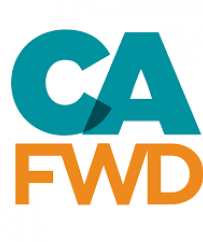California is backtracking on reopening as COVID-19 cases surge, and the grim economic implications of the pandemic are expected to have lasting effects. This week, California Forward put forth an action plan by CA FWD's, Fred Silva, Milken Institute's Matt Horton, and USC Sol Price School of Public Policy's Mark Pisano, which outlines how the state can rebuild the economy by rapidly investing more resources into infrastructure, while integrating investments in workforce training to ensure a steady pipeline of skilled workers and good, well-paying jobs. TPR shares this excerpt by Fox & Hounds, which outlines the recommendations in the report for rethinking how the state invests its resources to meet targeted goals environment, equity, resilience, and inclusion. Read the CA FWD's full report, here.

California Forward
“Investments in infrastructure can serve as a powerful potential catalyst in addressing gaps in equity while supporting the state’s long-term prosperity.”
As the state continues to navigate a reopening in the midst of a resurgence of COVID-19 cases, the grim economic implications of the pandemic are expected to have lasting effects.
To aid an equitable recovery, there must be a focus on how the state can institute a decision-making process to rapidly deploy resources and investments that not only improve the current conditions of those who have been hit the hardest, but also seizes the opportunity to correct the long-standing lack of investment that helped create the deep inequities we see today.
“Now is not the time to lean in on default policies that will continue to exacerbate the inequities magnified by the pandemic. Instead we must reimagine an economic renewal that will stimulate a resilient, equitable and sustainable economy,” said Micah Weinberg, CEO of California Forward.
In May, California Forward provided recommendations for creating an investment strategy for economic recovery. Today, in collaboration with leading scholars in the field, CA Fwd has released “The Need for Equitable Economic Revitalization,” a policy brief proposing an action plan for how the state can rapidly invest more resources into infrastructure, while integrating these investments in workforce training to ensure a steady pipeline of skilled workers and creating good, well-paid jobs as well.
“California continues to face a shortage of skilled workers and by aligning workforce development with infrastructure investments, we can create new employment opportunities that would allow for higher incomes and the revitalization of our communities,” said Mark Pisano, Professor of the Practice of Public Administration, USC Sol Price School of Public Policy.
The policy brief provides an approach to rethink the investment process, balancing economic growth with tangible investments in environment, equity, resilience and inclusion.
“Investments in infrastructure can serve as a powerful potential catalyst in addressing gaps in equity while supporting the state’s long-term prosperity,” said Matt Horton, Director of Center for Regional Economics and California Center at the Milken Institute.
Highlights from the brief include:
- Redesigning the state infrastructure investment process: The state should task a single entity to act as an investment authority with the ability to integrate functional investment priorities into a system of investments.
- Creating a new local-regional governance platform to partner with the state: Through revisions to Enhanced Infrastructure Financing District (EIFD) statutes already on the books, these local or regional entities are formed as Public Investment Authorities which create the potential for state and local revenues to be bundled together into financial and business plans that alter the economic performance of the region.
- Integrating the upskilling of California’s workforce to match the investment pipeline: To achieve their full potential, investments in physical infrastructure must be aligned with dedicated funding for workforce training programs.
- Institutionalizing regional civic leadership to enhance equitable investment: Implement, via statute, a more active civic engagement by including all community governments and the civic community in the newly formed governance platform noted above and by building out additional frameworks that foster inclusive regional planning, such as what’s been proposed by Assemblymember Rudy Salas’ AB 3205.
- Expediting the use of voter approved unsold bonds for immediate expenditure: There are approximately $34 billion in voter approved unsold bonds that should be expedited for shovel ready projects that are in the approval pipeline.
- Placing an infrastructure investment economic recovery bond measure on the ballot: A new proposal for the November 2020 ballot could specifically direct $20 billion in an infrastructure bond to meet regional and local infrastructure projects that are in the pipeline for the vast unmet infrastructure needs that plague our regional economies.
- Facilitating private capital investment integrated with workforce development: Equity in community investments can be improved by facilitating private sector investment tools aligned with local and state infrastructure investments and developing a collaborative approach involving workforce development stakeholders.
Creating better outcomes and investing in our communities, especially those who have historically been underinvested, is needed now more than ever.
With these types of strategies, California and its regions have an immediate opportunity to direct infrastructure investments where they could have a significant impact while enhancing a pipeline for skilled workforce.
To read “The Need for Equitable Economic Revitalization” policy brief, click here.
- Log in to post comments



